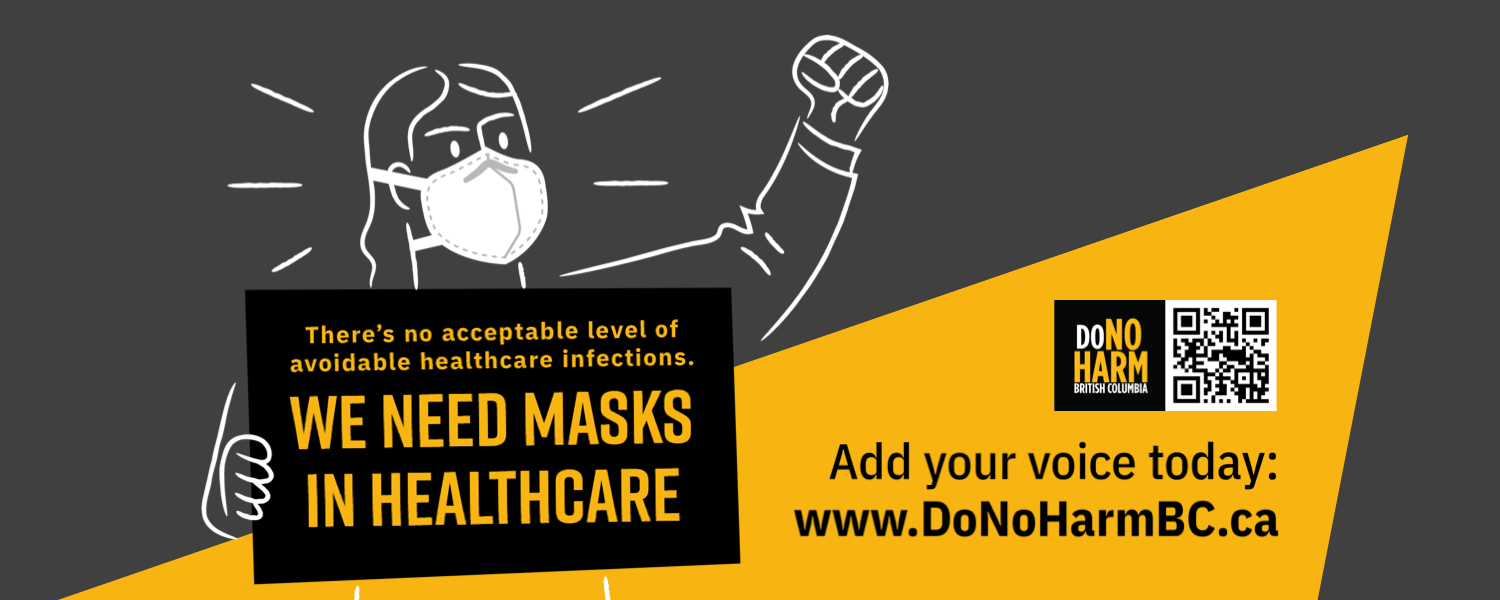Comments closedThe reality is that people are dying from COVID in our hospitals, and we really are doing very little to prevent them getting ill and getting infected. And we wouldn’t do the same for any other infectious disease.
Tag: COVID-19
Guelph wastewater testing will continue for COVID-19 and more by university researchers
Wastewater in Guelph will continue to be monitored for COVID-19, influenza and other illnesses through a new partnership between researchers at the University of Guelph and Wellington-Dufferin-Guelph Public Health.
The researchers will get samples of wastewater three times a week, then will submit their findings to public health, which will in turn publish it to a public online dashboard.
Provincial funding for wastewater testing was cut on July 31 with the Ontario government citing a federal program that tests wastewater; however, none of the testing sites are in Waterloo region or Guelph.
Comments closedAdvocates Urge BC to Reinstate Healthcare Mask Protections Amid Rising Risks
DoNoHarm BC, Protect Our Province BC and the Canadian Covid Society warn of infection risks in healthcare
December 10, 2024 (British Columbia, Canada) – Advocacy groups in BC are calling on policy-makers to immediately reinstate healthcare mask requirements. The call comes as BC faces severe risks from COVID-19, a rise in “walking pneumonia,” local measles warnings, and Canada’s first human case of H5N1 avian influenza – which health officials warn could potentially turn into another pandemic.
Comments closedWe can, and must, do more to protect students in higher education from the risks of post-COVID condition
Canada’s postsecondary institutions have a responsibility to protect students and others on campus from the risks of post-COVID condition as a matter of campus safety.
Canada’s Chief Science Advisor, Mona Nemer, recently released the report, Dealing with the Fallout: Post-COVID Condition and its Continued Impacts on Individuals and Society.
Post-COVID condition (PCC), also known as “long COVID,” refers to the poorly understood and often serious health damage left by the SARS-CoV-2 virus after the acute illness appears to have passed.
Universities, colleges and schools have a duty to take reasonable precautions to protect students, staff and faculty from foreseeable harms. They must ensure the water on campus is safe to drink. They must install fire and carbon monoxide detectors and make evacuation plans. Many have adopted a smoke-free policy on campus as part of a commitment to an international charter on health promotion in universities and colleges. Yet there is little pandemic health promotion on Canadian campuses.
Comments closedOpinion: This holiday season, let’s spread kindness, not COVID
Comments closedIt can be surprisingly simple to protect our health and the health of others — by masking in public with high-quality masks (such as KN95 or N95), testing before gatherings, increasing ventilation, and staying home if sick.
Almost a third of preteens, teens with long COVID still not recovered at 2 years, study shows
A new study from UK investigators shows that — while most COVID-19 patients ages 11 to 17 who reported long-COVID symptoms 3 months after the initial infection no longer experienced lingering symptoms at 2 years — 29% still did.
The findings, published in the journal Communications Medicine, come from the National Long COVID in Children and Young People cohort study, which followed up on thousands of young people after their COVID-19 diagnoses.
Comments closedExperimental study shows connection between COVID infection and age-related blindness
An experimental study in mice shows that SARS-CoV-2 infection can damage the retinas, with long-term implications for vision. Post-acute sequelae of SARS-CoV-2 infection include various neurocognitive symptoms, suggesting the virus can affect the central nervous system. The eyes are also part of the central nervous system, but little is known about the virus’s effects on these organs.
Comments closedSevere COVID-19 may be a risk factor for multiple sclerosis
COVID-19 may be a risk factor for multiple sclerosis (MS). This has been shown by new research at Örebro University and Örebro University Hospital, Sweden. The study is published in the journal Brain Communications.
“We saw a raised risk of MS among people who had severe COVID-19. However, only an extremely small number of people who had severe COVID-19 received a subsequent MS diagnosis,” says Scott Montgomery, professor in clinical epidemiology.
Comments closedA Kingston family doctor is being ordered to repay more than $600,000 to the Ontario government for what the province says was reimbursement for improperly billed medical services related to mobile COVID-19 vaccination clinics.
Dr. Elaine Ma has been told by the Health Services Appeal and Review Board to repay $600,962.61, plus interest, to the Ontario Health Insurance Plan (OHIP), to reimburse money she billed the province for vaccinations administered during drive-in COVID-19 vaccination clinics between July 2021 and January 2022.
Comments closedLong a ‘Crown Jewel’ of Government, N.I.H. Is Now a Target
The National Institutes of Health, the world’s leading public funder of biomedical research, has an enviable track record. Research supported by the agency has led to more than 100 Nobel Prizes and has supported more than 99 percent of the drugs approved by federal regulators from 2010 to 2019.
No surprise, then, that the agency has been called “the crown jewel of the federal government.” But come January, when President-elect Donald J. Trump and congressional Republicans take charge, the N.I.H. may face a reckoning.
Comments closedStanford Doctor Tapped for Key Post by Trump Advocated for Letting COVID Spread
President-elect Donald Trump’s choice this week to lead the National Institutes of Health is a controversial Stanford researcher who was highly critical of the COVID-19 pandemic response, drawing pushback from the medical community and some still suffering from the long-term effects of the disease.
Dr. Jay Bhattacharya, a professor of health policy and senior fellow at the Stanford Institute for Economic Policy Research, was one of three co-authors of a 2020 letter that challenged policies like lockdowns and mask mandates, and called for speeding up herd immunity.
Comments closedLet’s put Montreal’s idle pharmaceutical plant to good use
When COVID-19 first struck, Canada had a problem: It lacked domestic capacity to manufacture vaccines. Today, the government of Canada faces the opposite problem: It owns a factory that isn’t manufacturing vaccines.
The Biologics Manufacturing Centre (BMC) in Montreal was completed in 2021 at the cost of $126 million, and fully licensed by Health Canada in 2022. However, a 2021 deal with Novavax to produce their COVID-19 vaccine looks increasingly unlikely to produce a single dose. Indeed, despite annual operating costs around $17 million a year, the BMC has never produced anything.
Comments closedAnalysis of 25 studies shows reduced risk of long COVID after vaccination
A new meta-analysis of studies involving more than 14 million people published in the Journal of Infection shows that COVID-19 vaccination is associated with a lower risk of developing long COVID, with two doses reducing the odds by 24% and one dose reducing the odds by 15%.
In the 25 studies published up to February 2024 that were included for analysis, long COVID was defined as persistent symptoms at 3 months or beyond, and all studies compared long-COVID symptoms between vaccinated and unvaccinated groups, with the number of doses received by participants specified. All studies included were observational trials and included in total 14,128,260 participants.
Comments closedTrump’s brain drain: Fox News personalities tapped to become America’s next top scientists, doctors
A couple of days after the election this year I wrote that I thought a lot of the anti-incumbent movement these past couple of years had to do with unprocessed trauma from the global pandemic. Here in America, we lost over 1.2 million people in a very short time from a deadly disease that humans had never seen before. Within just a few weeks in the spring of 2020, New York City alone had lost more than 15,000 people. All of our medical systems were strained, supplies were unavailable and the whole country, the whole world, was in a state of barely suppressed panic. I don’t think we’ve ever really dealt with exactly what happened. And now we are in danger of doing it all over again.
Donald Trump failed miserably at the most important thing he was tasked with doing at the time: reassuring the public. He instead lied, complained, pushed snake oil cures and worried more about the effects of the pandemic on his re-election prospects than the health of the American people. Bob Woodward’s book “Rage” lays out a terrifying narrative, from taped interviews with Trump himself, of just how inept and dishonest he was.
Mother Jones’s David Corn reported on the findings of The Select Committee on the Coronavirus Crisis which found that senior Trump officials tried to block CDC scientists from warning the public and barred them from holding press conferences as would be the usual protocol, substituting those demented Trump TV briefings instead. The White House listened to conspiracy theorists and unorthodox quacks with little experience in the field and leaned on the Centers for Disease Control (CDC) to change its recommendations. The result of Trump’s mismanagement of the crisis is estimated to have resulted in hundreds of thousands of unnecessary deaths in the days before the vaccines became widely available.
Comments closedEverything Wrong with Canada’s Proposed Long COVID Recommendations
Researchers involved in the organizations Cochrane Canada and the McMaster GRADE Centre at McMaster University are developing guidelines to prevent and treat Long COVID in Canada. Their effort is supported by the Public Health Agency of Canada and their recommendations would likely have major sway in the way Long COVID is treated if adopted.
Every month, they release new recommendations and provide an opportunity for public comment. On November 20th, the group released a new set of Canadian Post-COVID Condition (CAN-PCC) recommendations which propose harmful and ineffective treatments: Exercise to prevent Long COVID and cognitive behavioral therapy (CBT) to treat post-exertional malaise (PEM).
Comments closed

